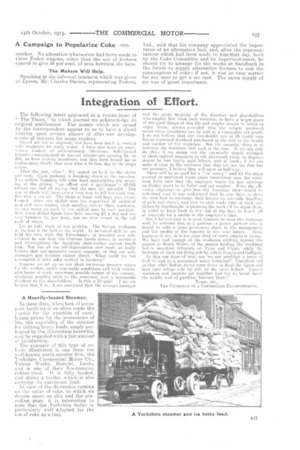Integration of Effort.
Page 15

If you've noticed an error in this article please click here to report it so we can fix it.
The following letter appeared in a recent:_dssue of " The Times," to which journal we acknowledge its original publication. The points which are raised by the correspondent appear to us to have a direct bearing upon certain phases of after-war developments of interest for many readers.
am not an engineer, but have been much in contact with engineers for many years. I have also been an orreniV,sreus student of socio-economic literature. Soft-handed friends—unaccustomed to manual labour—are earning 5d. to 10d. an hour making munitions, and they have helped me to realize more clearly than over what a 10-hour day in the shops ita,aos.
After the war, what? We cannot go haelt to the straw qw+ ante. Class jealousy is breaking down in the trenches. Two million Tummies will come back appreciating the mean jig the phrase " an officer and a gentlema.n"; 50,C00 oilTeers one and all saying that the men are splendid. The war of ideals will have gone a long way to kill the class war. Bet that is not all. The shops at home will have been trans. formed. After one skilled man has supervised 10 unskilted inert and even women, each minding two Or three machines, v:e eau never .ao back to one skilled man to each machine. Nor, when skilled hands have been earning £1 a day and the very labourer is. per hour, can we ever revert to the old Suale of wages.
Let us take steel: of our position. The British workman at his best is the best in the world. In technical skill he can held his own with the Frenchman ; in resource and selfreliance he can beat the German hands down; in accuracy and thoroughness the American shop-worker cannot touch him. or has all our self-depreciation ever made us really believe that our managers cannot organize, or that our submanagers and foremen cannot direct. What could we rot Accomplish if bdth sides worked in harmony?
Suppose we set up as our ideal maximum possible wages fer the worker, ender reasonable conditions arid with reasonaide hours of work, maximum possible output of the concern, minimum possible price to the consumer and a reasonable dividend to the shareholders. Is this a 'Utopia? I do net believe that it is. I arn convinced that the averaee manager
A Heavily-loaded Steamer.
In these days, when lack of transport facilities is so often made the excuse for the exaction of exorbitant prices for the necessaries of life, the capability of the steamer for shifting heavy loads, amply portrayed by the illustration herewith, may he regarded with a fair amount of satisfaction.
. The example of this type of vehicle illustrated is one from the well-known north-country firm, the Yorkshire Commercial Motor Co., Vulcan Works, Ilunslet, Leeds, and is one of their five-tanners, Tubber-tired. It is fully loaded, and draws a trailer, which is also carryingits maximum load. In view of the discussion turning on the value of coke, to which we devote space oft this and the preceding page, it is interesting to .note that the Yorkshire boiler is -particularly well adapted for thc use of coke as a fuel. and the great majority of the directors and shareholders who employ him want each workman to have a larger share of the.-good things of this life and ampler leisure in which to enjoy them, always provided that the output produced meter these conditions can be sold at a reasonable net profit. I do not believe that one ebareholder out. of 10 would vote furean increased dividend purchased at the cost of the health and comfort of the workmen. But the essential thing is tO convince the workman that such is the case. If we can only do this; if we stamp out the essentially stupid attempts of short-sighted managers to cut pieeewurk rates, to displace dearer by less highly paid labour, and so forth; if we can make it clear to the workmen that they are notour foes but our partners, I believe they will meet us half-way.
There will be no need for a "ca' canny " and all the other avowed or tmavowed trade union restrictions once the workman feels sure that the employer WalltS hiS pay envelope on Friday night to be fuller and not emptier. Even the efficiencyengineer—to give him his AmelleaLl title—would be weleomed once it was understood that he seas there to show the men how to minimize their fatigue by eeientifie handling of pick and shovel, arid how to Save waste time of their machines by forethought in planning the work : if he urged them. in order to keep fresh to the end of the 'day, to knock off at intervals for a smoke in the employer's time.
Sir, I believe that it is good business to treat the workman well, to welcome hire RA a partner--a junior partner who is bound to take a more prominent share in the management and the profits of the concern in the near future. Good business or net, it is the clear duty of every employer to-day. We have had enough of the workman striking against the master in South Wales, of the master hauling the workman before munition tribunals on Tyne and Clyde, while the brothers of each are dying side by side in France ann. Gallipoli. In this our time of trial can we not. establish a truce of God to lead to a permanent peace hereafter? Travellers tell us that when Indian rivers come down in flood the tigers anal deer take refuge side by side on the same hillock. Cannot workmen and masters get together and try to break down the middle wall of partition between them?
THE CITAMMAN OE A CONTROLLED ESTABLISHMENT.




















